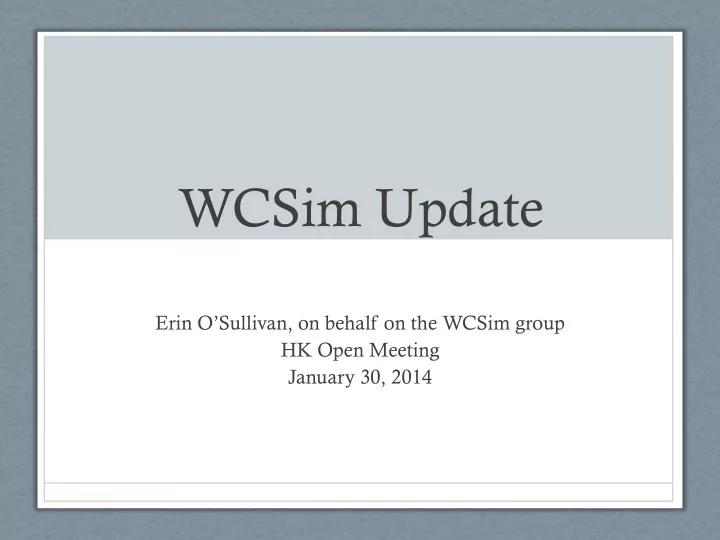

WCSim Update Erin O’Sullivan, on behalf on the WCSim group HK Open Meeting January 30, 2014
An Introduction to WCSim
What is WCSim? WCSim: An open-sourced, GEANT4-based simulation code for water Cherenkov detectors. • User can define a detector configuration by choosing a PMT type, cylinder size, option to add Gadolinium loading. Also, the HK detector is defined here. • Run particles in your detector using either a user-defined vector file or using GEANT4 particle generation.
How do I get WCSim? 3 Different Methods 1. git clone the development branch from GitHub. This will give you the most up-to- date version of the code. 2. Download a zip file of a release (currently v1.2.0). This will give you a stable version of the code. 3. Download it as part of the Hyper-K software package.
https://github.com/WCSim Fork a copy of the code Get the zip or tar file of the newest release (v1.2.0) git clone commands for https, ssh or svn
https://github.com/WCSim Get emails when there are new pull requests or issues See ongoing issues or report bugs you find Browse the code See any outstanding pull requests
How do I implement a change in WCSim? • Make a new branch on your local forked copy • Push your new branch to GitHub • Make a pull request and discuss! • Modify your pull request based on feedback • Your pull request is merged
How do I implement a change in WCSim?
Where can I get help with WCSim? • If you find a bug or have a suggestion for how to enhance the code, you can open an issue on GitHub. • If you have a general code question, you can email the HK software mailing list: hkwg-software@suketto.icrr.u- tokyo.ac.jp
v1.2.0: Changes to the code structure
Separating the PMT and Digitizer in WCSim Motivation • Separating the code allows for different developers to work on the individual components • Is a move toward making the electronics in WCSim more flexible by making it easier in the code to implement a new type of PMT or digitizer.
Separating the PMT and Digitizer in WCSim Old setup in WCSim: PMT and digitizer together. True Info: Contains info about which PMTs were hit, hit time, etc “Digitizer”: Contains info about the PMT (ex. charge conversion), the digitizer (ex. gating, threshold), and information about the PMT and digitizer together (ex. electronics response)
Separating the PMT and Digitizer in WCSim New setup in WCSim: PMT and digitizer are separate. True Info: Contains info about which PMTs were hit, hit time, etc PMT: Converts a hit to the corresponding charge. Digitizer: Contains info specific to the digitizer
Making the PMTs in WCSim more modular Motivation • Implementing this change will allow users to “plug in” any of the predefined PMT types when they create a detector geometry. • This will also allow all of the PMT information to be in one place, making it more straight forward for users who want to implement a different type of PMT.
Making the PMTs in WCSim more modular Base Class: WCSimPMTObject Derived 10” HQEPMT 8” PMT 10” PMT Classes: 20” PMT 12” HQEPMT 20” HQEHPD Member GetPMTName GettimingResolution Functions: GetPMTRadius GetQEWavelength GetPMTExposeHeight GetQE Getqpe0 GetmaxQE GetPMTGlassThickness
Making the PMTs in WCSim more modular WCSimDetectorConfigs.cc: Possibilities for CreatePMTObject are PMT20inch, PMT8inch, PMT10inch, PMT10inchHQE, PMT12inchHQE, HPD20inchHQE
v1.2.0: New features in WCSim
Adding HPDs to WCSim • 1 p.e. distribution: measured value of 8 inch HPD in EGADS tank (champion data) • Quantum Efficiency: QE of High QE SK PMTs which were the candidates of PMTs in EGADS. • Timing resolution: measured value of 8 inch HPDs • Photodetector shape: based on the design drawing Information from Okajima-san
New Detector Configuration for Hyper-K w/HPD
Some small add-ons • Alex has added a python script which generates vectors for monoenergetic single particles in the SK geometry • There is now a crude verification script which looks at the basic outputs of WCSim (charge, time, number of tubes hit) and compares them to the output of a clean check out of the code.
Ongoing work: More changes in the electronics scheme
FADC in WCSim Making the digitizer more flexible in the code and implementing the FADC to see if there are any benefits to using an FADC over the TDC/ADC electronics Information from Thomas Lindner
How can I get involved?
Simulate the SK-IV Detector in WCSim
Other Open Issues on GitHub • Document and internally comment the HK geometry section of the code • Check/validate the Gd model • Check/validate the physics list • Check if code is compatible with newest Geant4 release • Add a validation suite
Conclusion • WCSim is now on GitHub • Many changes to the electronics in the code to make it easier to swap out different PMT types • HPDs are now available in the code and the Hyper- K with HPD geometry is available for use. • Please get involved!
40 QE [%] High-QE R3600 ZP0007 35 ZP0012 ZP0014 30 ZP0015 ZP0021 ×1.5 25 ZP0022 ZP0024 ZP0025 20 Normal SK PMT 15 Normal-QE R3600 10 5 0 300 350 400 450 500 550 600 650 700 Wave Length [nm]
5 Timing resolution [ns] 4.5 HPD timing resolution (measured value) 4 HPD timing resolution (WCSim parameter) 3.5 PMT timing resolution (WCSim parameter) 3 2.5 2 1.5 1 0.5 0 0 5 10 15 20 25 30 Charge [p.e.]
Recommend
More recommend